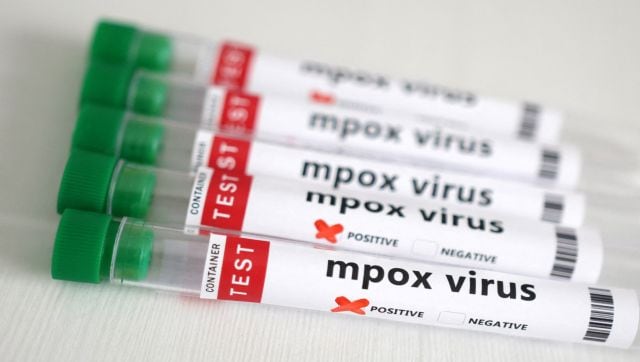Mpox, which has been spreading at a rapid rate across the world, has finally landed on India’s shores with a 38-year-old man from Kerala being positively diagnosed with the virus’ Clade 1B on Monday.
Prior to this, another person was found to have the infection in Delhi, with officials later confirming that he had been diagnosed with the Clade II infection.
India has reported at least 32 mpox cases and one death since 2022, but the Kerala man is the first in the country to have the clade 1b.
What is the clade 1b infection? Is it any different from other strains? Should India be worried? We answer this and more.
India’s first clade 1B infection
On Monday (September 23), it was reported that a
38-year-old man from Kerala’s Malappuram district became the country’s first reported case of the mpox clade 1b strain. He had recently returned from the United Arab Emirates following which he was diagnosed with mpox.
Officials said that the patient is stable for now. They said that the man had a fever and rash similar to chickenpox on his body, after which the doctor got suspicious and sent a sample for testing.
Following this, Malappuram’s health officials put 29 friends and family members along with 37 passengers on the same flight under observation. However, none of them have shown any signs or symptoms of mpox.
Earlier in the month, another man — a 26-year-old from Haryana’s Hisar — was diagnosed with mpox. However, he tested positive for the West African Clade 2 strain.
Mpox clade 1b, explained
But what exactly is this clade 1b that the Kerala man is diagnosed with?
For starters, Mpox is separated into two different clades: clade I and clade II. According to experts, clade 1 is the more virulent, and deadlier version of mpox, while clade II is the strain that caused the global outbreak that began in 2022. Infections from clade II mpox are less severe, with more than 99.9 per cent of people infected surviving the disease.
The clade 1b strain was first identified in the eastern region of the Democratic Republic of Congo. A report by Fortune states that the outbreak of mpox clade 1b originated in the mining town of Kamituga in the South Kivu province of the Democratic Republic of the Congo. Later, it spread to adjoining countries such as Uganda, Rwanda, Burundi and Kenya.
And in August, owing to its transmission, the
World Health Organization (WHO) sounded its highest level of alarm and declared mpox as a Public Health Emergency of International Concern.
Epidemiological data suggests that mpox clade 1b transmits more readily between people than previous strains did. Experts also add that clade Ib’s genome contains genetic mutations that seem to have been induced by the human immune system, suggesting that it has been in humans for some time.
It is also reported that clade 1 strains are more severe with the mortality rate being around three per cent. But health experts note that in the Democratic Republic of the Congo, this is as high as even 10 per cent among children.
But how do you differentiate between mpox clade 1 and clade 2? Patients with the clade 1 strain may experience skin rashes, which are more intense, with larger lesions, and more pronounced lymphadenopathy.
Dr Ajay Agarwal, senior director – Internal Medicine, Fortis Hospital in Noida, was quoted as telling the Times of India earlier, “Clade 1 usually causes more severe symptoms like high fever, severe headache, myalgia and enlarged lymph nodes. The skin lesions are usually extensive and can often cause scarring of the affected regions whereas Clade 2 is associated with milder symptoms.”
Spread of mpox clade 1b across the world
Away from DRC and Africa, the clade 1b strain has been identified in Thailand in one male in August. Officials said that the individual identified as a 66-year-old European male, reportedly returned from an unnamed African country currently experiencing a “large” outbreak of the Clade 1 variant.
In Europe, the clade 1b strain was also diagnosed in a man in Sweden in August. As per the European Centre for Disease Prevention and Control, it is highly probable that Europe will see more cases of Clade 1 owing to frequent travel between Europe and Africa.
India’s prep for mpox
Ever since the WHO sounded an alert on mpox, India has stepped up its vigilance against the infection. In Kerala itself, the authorities brought out a Standard Operating Procedure (SoP) to deal with the infection and curb its transmission.
In the matter of the man now diagnosed with the clade 1b strain, Kerala Health Minister Veena George has already urged the public to inform health officials of their international travel and seek treatment at the earliest. She also released a list of state-run hospitals in various districts where treatment and isolation facilities for the affected persons have been arranged.
On a national level, the Centre has asked directed hospitals across the country to identify patients with rashes and prepare isolation wards. Moreover, diagnostic labs have been asked to be ready and equipped with testing tools for timely identification of the virus.
All airports as well as ports have also been put on alert. States have also been asked to ramp up the surveillance in their jurisdiction. At
Bengaluru’s Kempegowda International Airportinternational traveller have to undergo thermal scanning. As part of their heightened vigilance, authorities have also said that those flyers who exhibit symptoms similar to mpox will be isolated and tested in accordance with government protocols.
“All international passengers arriving at the airport are being thoroughly checked for elevated temperatures as part of the screening process. In addition, an isolation zone has been established on-site to manage any suspected cases swiftly and efficiently. Our medical services, under the guidance of health authorities, are equipped to handle any situation that may arise. The health and safety of passengers and airport personnel remain our top priority, and we are committed to maintaining the highest standards of precautionary measures,” an airport official said, as quoted by The Hindu.
With inputs from agencies






